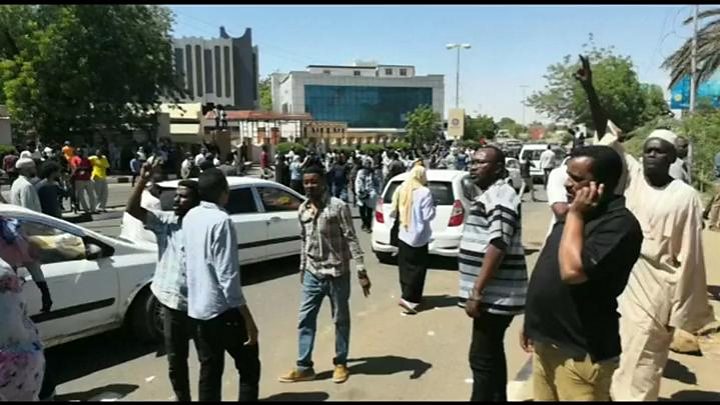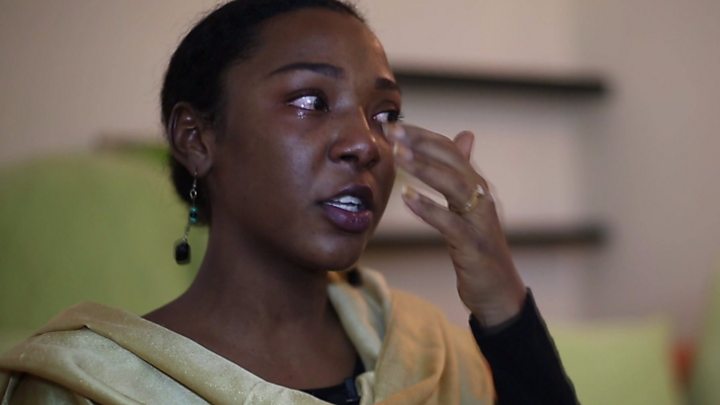Sudan protesters keep pressure on Bashir
Thousands of demonstrators are spending a second night camped outside Sudan’s army headquarters, demanding that President Omar al-Bashir step down.
They appear to be hoping for an internal coup, pleading with the army command to remove Mr Bashir and open the way for a transitional government.
It is the biggest protest against Mr Bashir since unrest began in December.
Mr Bashir has refused to leave, saying opponents should seek power through elections. The army has not intervened.
Security forces have fired tear gas to try to disperse protesters outside the army compound in the capital, Khartoum.
The latest rallies mark the 34th anniversary of the coup that overthrew the regime of former President Jaafar Nimeiri.
In previous protests they have also used stun grenades and live bullets. Dozens of demonstrators have been killed.
On Saturday, a protester died in Khartoum’s twin city of Omdurman, police said.
Sudan’s information minister has reaffirmed the government’s plan to resolve the crisis through talks and praised the security forces.
Unpredictable political struggle
By Fergal Keane, BBC Africa Editor
Certainly the scenes in Khartoum are impressive. Nothing like these crowds has been witnessed in decades.
But there have been several deaths and there is the possibility of a brutal crackdown operation at any moment.
And even if Mr Bashir were to step down there is no certainty that he would be replaced by the pluralistic government demanded by the demonstrators.
Authoritarian states in 21st Century Africa have become adept at creating the impression of change but delivering little of its substance.
What is unfolding now may be part of a much longer and more unpredictable political struggle.
Why are people protesting?
Journalist Mohamed Ali Fazari, who was at the scene in Khartoum, said protesters were urging the army to side with the people against the government.
The crowd chanted “freedom, freedom, justice – one people one army”, he told BBC Focus on Africa radio.
The protests were originally sparked by a hike in the cost of living but are now calling for the president, who has been in power for nearly 30 years, to step down.
Sudan’s economy has long been strained since the US imposed sanctions more than 20 years ago, accusing Khartoum of sponsoring terror groups.
In December last year, the Sudanese government announced the price of fuel and bread would rise.
In the year leading up to this, inflation had risen while the Sudanese pound fell rapidly in value.
The announcement of the price rises triggered protests, which evolved into calls for President Bashir to step down.
His rule has been blighted with accusations of human rights abuses. In 2009 and 2010, the International Criminal Court (ICC) charged him with counts of genocide, war crimes and crimes against humanity. A warrant for his arrest has been issued.
Who are the demonstrators?
The Sudanese Professionals Association (SPA) – a collaboration of health workers and lawyers – has been organising the protests.
Doctors have emerged as a leading force and as a result are being targeted by the authorities.
It is estimated that up two thirds of the protesters are women, who say they are demonstrating against Sudan’s sexist and patriarchal society.
How has the president responded?
In February, it looked like he might give in to protests and step down, but instead Mr Bashir declared a state of national emergency.
On the streets, security has been heavy, with tear gas used indiscriminately and reports of violence commonplace.
Sudanese authorities have been accused of arresting prominent activists and targeting medics, which the National Intelligence Security Service has denied.
Authorities say 32 people have died in protest-related violence so far, but Human Rights Watch says the figure is more like 51.
The pressure group Physicians for Human Rights says it has evidence of killing, persecution and torture of peaceful protesters and the medics caring for them.
Source: Read Full Article





